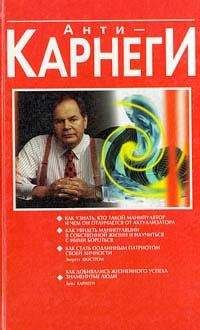Эверетт Шостром - Человек - манипулятор
Необходимо до конца прояснить, что мы, как психологи, не можем позволять нашим пациентам возводить нас в ранг богов. Когда пациент делает из психолога бога, он проецирует на него всю свою силу, ставя себя в роль слабой "собаки снизу". Итак, я не образец совершенства, я лишь образец абсолютной гуманности.
Я понимаю, что рискую быть осужденным за некоторые из раскрытых мною фактов, но я также знаю, что должен быть собой — именно таким, каким я на самом деле являюсь, не зависимо от того, насколько я глуп, смешон или безобразен. Это я, и обязан быть патриотом себя. Ибо, только если я буду собой (всеми своими манипуляциями и всем остальным), пришедшее в результате осознание усилит мою актуализацию.
ЗаключениеЭтот "внутренний путь" от манипуляций к актуализации не нов. Он лишь описан в книге с помощью современной терминологии. Для заключения, я думаю, будет уместным привести слова Вудро Вильсона, которые он написал более шестидесяти пяти лет назад:
"Человек возрождается и испытывает благотворные изменения, когда "приходит к себе". Это происходит не только после периодов безрассудства или слепой страсти, когда он проматывал жизнь и валял дурака… Он приходит к себе после опыта, о котором знает лишь сам: тогда он протирает глаза, чтобы увидеть мир таким, какой он есть, и свое место и назначение в нем. Это процесс избавления от иллюзий. Он трезво воспринимает себя… и свои возможности. Он избавился от всех своих предубеждений… он изучил свою походку; нашел свою опору. Это процесс избавления от иллюзий, но он не приведет в уныние ни одного сильного человека" /61/.
Ссылки
1. Erich Fromm "Man Is Not a Thing", Saturday Review, March 16, 1957, pp. 9 — 11.
2. Timothy Leary "The Interpersonal Theory of Personality", New York: The Ronald Press Company, 1957.
3. J. F. T. Bugental "The Search of Authenticity", New York: Holt, Rinehart & Winston, 1965, p. 298.
4. Там же, р. 299.
5. Albert Ellis "New Approaches to Psychotherapy", Journal of Clinical Psychology, Monograph Supplement, 1955, p. 11.
6. Martin Buber "The Way of Man", Chicago: Wilcox and Follett, 1951, p. 16.
7. Jay Haley "Strategies of Psychotherapy", New York: Grune & Stratton, 1963, pp. 89 — 90.
8. Frederick Peris "Ego, Hunger and Aggression", London: George Alien and Unwin, 1947, p. 108.
9. Там же, р. 178.
10. Erich Fromm "The Art of Loving", New York: Harper & Row, [1956] 1962, p. 26.
11. Eugene Burdick "The Ninth Wave", Boston: Houghton Mifflin Company, 1956, p. 90.
12. Dan Greenburg "How to Be a Jewish Mother", Los Angeles: Price/Stern/ Sloan Publishers, 1965, pp. 15, 16.
13. Там же, р. 17.
14. Е. L. Shostrom "Personal Orientation Inventory" (San Diego: Educational and Industrial Testing Service, 1964).
15. CM. David Riesman "The Lonely Crowd" (Garden City, N. Y.: Doubleday Anchor Books, 1950).
16. "A Test for the Measurement of Self-Actualization", Educational and Psychological Measurement, XXIV (1965), 207-18.
17. Abraham H. Maslow "Toward a Psychology of Being" (Princeton, N. J.: D. Van Nostrand & Co., 1962), p. 30.
18. Abraham H. Maslow, "Innocent Cognition (as an aspect of B- Cognition) ", Notes on D-Psychology (La Jolla, Calif.: Western Behavior Sciences Institute, August 31, 1961). pp. 1 — 2.
19. Kahlil Gibran "The Prophet" (New York: Alfred A. Knopf, 1923), pp. 70 — 71. Used by permission.
20. Gene Sagar, неопубликованная рукопись.
21. Erich Fromm "The Heart of Man", ed. by Ruth N. Ashen (New York: Harper & Row, 1964), pp. 52, 132.
22. Abraham H. Maslow "Motivation and Personality" (New York: Harper & Row. 1954), p. 222.
23. Там же, р. 291.
24. "The Neurotic Personality of Our Time" (New York: W. W. Norton & Company, 1937), pp. 270 — 75.
25. "The Search, for Authenticity", p. 209.
26. Marie Robinson "The Power of Sexual Surrender" (New York: Doubleday S. Company, 1959), pp. 209 — 12.
27. Alan W. Watts "The Wisdom of Insecurity" (New York: Random House, 1919), pp. 9 — 10.
28. "Faces of Envy", Review of Existential Psychology and Psychiatry, 1 (Spring, 1961), pp. 134–135.
29. "Ego, Hanger and Agression", p 224.
30. См. Gary Herbertson "Maxie Dunnam".
31. Edward Stanford Martin «Mixed», перевод И. Малышевой.
32. Karen Horney "Neuroses and Human Growth" (New York: W. W. Norton & Company, 1950).
33. Dorothy W. Baruch "How to Live with Your Teen-Ager" (New York: McGraw-Hill Book Company, 1953).
34. Там же, р. 69.
35. Там же, р. 11.
36. See R. L. Williams, ed. "The Young Americans" (New York: Time- Life Books, 1966), p. 70.
37. Karen Horney «Self-Analysis» (New York: W. W Norton 8: Company, 1942), p. 283.
38. William G Cole "Sex in Christianity and Psychoanalysis" (New York, Oxford University Press, 1955), p. 26.
39. CM. "The Art of Loving", p 88.
40. Из неопубликованного "Psychology of the Learning Process".
41. Там же.
42. См. "A Ministry in Need of New Rights", p. 85 в "The Young Americans".
43. Там же.
44. Ellis P. Torrance "Guide Creative Talent", N. J., 1962.
45. См. "Toward a Psychology of Being".
46. Е. L. Shostrom "Caring Relationship Inventory", 1966.
47. Деструктивные и конструктивные стили борьбы, представленные в этой главе, разработаны Джорджем Бахом, Калифорния. См. G. R. Bach, "The marital Fight Game", Life, May, 17, 1963.
48. См. Abraham H. Maslow "Eupsychian Management", 1965.
49. P. Steiner "The Stevenson Wit and Wisdom", 1965.
50. Rollo May «Existence» (New York: Basic Books. 1958).
51. Carl R. Rogers "Client-Centered Therapy" (Boston: Houghton- Mifflin Company, 1959).
52. Harry S. Sullivan "The Interpersonal Theory of Psychiatry" (New York: W. W. Norton & Company, 1953).
53. Eric Berne "Transactional Analysis in Psychotherapy" (New York: Grove Press, 1961) and Frederick Peris "Gestalt Therapy" (New York: Julian Press, 1951).
54. Timothy Leary "Interpersonal Diagnosis of Personality" (New York: The Ronald Press Company, 1957).
55. Viktor E. Frankl "Man's Search for Meaning" (New York: Beacon Press, 1963), p. 171.
56. Joseph Wolpe "Psychotherapy by Reciprocal Inhibition" (Stanford: Stanford University Press, 1958) and Albert Ellis "Reason and Emoition in Psychotherapy" (New York: Lyie Stuart, 1962).
57. Sidney M. Jourard "The Transparent Self" (Princeton, N. 1: D. Van Nostrand Co., 1964), p. 21.
58. Victor Victoroff "The Assumptions We Live By", Etc., XVI (1958), pp. 17 — 18.
59. Charlotte Buhler "Values in Psychotherapy" (New York: Free Press, 1962).
60. Otto Fenichel "The Psychoanalytic Theory of Neurosis" (New York: W. W. Norton & Company, 1945).
61. Woodrow Wilson "When a Man Comes to Himself", The Century, XL, June, 1901, p. 268.




